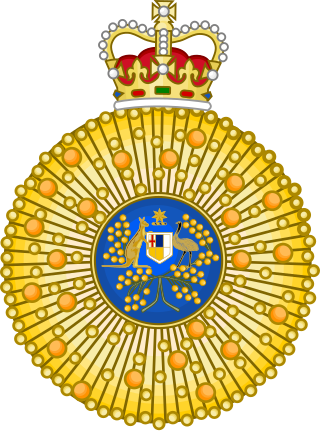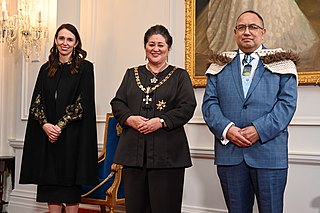
The governor-general of Australia is the federal representative of the monarch of Australia, currently Charles III. The governor-general has many constitutional and ceremonial roles in the Australian political system, in which they have independent agency. However, they are generally bound by convention to act on the advice of the prime minister and the Federal Executive Council. They also have a significant community role, through recognising meritorious individuals and groups, and representing the nation as a whole. The current governor-general is Sam Mostyn.

A prime minister or chief of cabinet is the head of the cabinet and the leader of the ministers in the executive branch of government, often in a parliamentary or semi-presidential system. A prime minister is not the head of state, but rather the head of government, serving as the chief of the executive under either a monarch or a president in a republican form of government.

The prime minister of Australia is the head of government of the Commonwealth of Australia. The prime minister is the chair of the Cabinet of Australia and thus the head of the federal executive government. Under the principles of responsible government, the prime minister is both responsible to and a member of the Commonwealth Parliament. The current prime minister is Anthony Albanese of the Australian Labor Party, who assumed the office on 23 May 2022.

The House of Representatives is the lower house of the bicameral Parliament of Australia, the upper house being the Senate. Its composition and powers are set down in Chapter I of the Constitution of Australia.
A member of parliament (MP) is the representative in parliament of the people who live in their electoral district. Members of parliament typically form parliamentary groups, sometimes called caucuses, with members of the same political party. Many countries with bicameral parliaments, this term refers only to members of the lower house since upper house members often have a different title. The terms congressman/congresswoman or deputy are equivalent terms used in other jurisdictions. The term parliamentarian is also sometimes used for members of parliament, but this may also be used to refer to unelected government officials with specific roles in a parliament and other expert advisers on parliamentary procedure such as the Senate parliamentarian in the United States. The term is aMembers of parliament typically form parliamentary groups, sometimes called caucuses, with members of the same political party.lso used to the characteristic of performing the duties of a member of a legislature, for example: "The two party leaders often disagreed on issues, but both were excellent parliamentarians and cooperated to get many good things done."

The Order of Australia is an Australian honour that recognises Australian citizens and other persons for outstanding achievement and service. It was established on 14 February 1975 by Elizabeth II, Queen of Australia, on the advice of then prime minister Gough Whitlam. Before the establishment of the order, Australians could receive British honours, which continued to be issued in parallel until 1992.

The Right Honourable is an honorific style traditionally applied to certain persons and collective bodies in the United Kingdom, the former British Empire and the Commonwealth of Nations. The term is predominantly used today as a style associated with the holding of certain senior public offices in the United Kingdom, Canada, New Zealand, and, to a lesser extent, Australia.

The prime minister of the Netherlands is the head of the executive branch of the Government of the Netherlands. Although the monarch is the de jure head of government, the prime minister de facto occupies this role as the officeholder chairs the Council of Ministers and coordinates its policy with the rest of the cabinet. In his role as the de facto head of government, the prime minister also represents the Netherlands in the European Council. Fourty-three men have served in the position. The current prime minister, Dick Schoof, has been in the position since 2 July 2024, with his cabinet being sworn in on the same day.
A cabinet secretary is usually a senior official who provides services and advice to a cabinet of ministers as part of the Cabinet Office. In many countries, the position can have considerably wider functions and powers, including general responsibility for the entire civil service.

The Cabinet of Australia, also known as the Federal Cabinet, is the chief decision-making body of the Australian government. The Cabinet is selected by the prime minister and is composed of senior government ministers who administer the executive departments and ministries of the federal government.

The president of the Slovak Republic serves as the head of state of Slovakia and commander-in-chief of the Armed Forces. The people directly elect the president for five years, for a maximum of two consecutive terms. The presidency is essentially a ceremonial office, but the president exercises certain limited powers with absolute discretion. Their official residence is the Grassalkovich Palace in Bratislava.

The Order of precedence in New Zealand is a guide to the relative seniority of constitutional office holders and certain others, to be followed, as appropriate at State and official functions. The previous order of precedence was revoked and Queen Elizabeth II approved the following Order of Precedence in New Zealand effective 20 September 2018:
- The Monarch of New Zealand.
- The Governor-General or, while acting in the place of the Governor-General, the officer administering the Government
- The Prime Minister
- The Speaker of the House of Representatives
- The Chief Justice
- The Dean of the Diplomatic Corps
- The Deputy Prime Minister
- Ministers of the Crown
- Former Governors-General
- Ambassadors and High Commissioners in New Zealand and Chargés d’Affaires accredited to New Zealand.
- The Leader of the Opposition in the House of Representatives
- Leaders, including co-leaders and joint leaders, of political parties represented in the House of Representatives, other than Ministers of the Crown.
- Members of the House of Representatives. There is no established order of precedence over members of parliament in general, although each party has its internal ranking.
- Judges of the Supreme Court of New Zealand, the Court of Appeal and the High Court of New Zealand.
- Former Prime Ministers, former Speakers of the House of Representatives, former Chief Justices, and members of the Privy Council.
- Mayors of territorial authorities and chairpersons of regional councils, while in their own cities, districts and regions. In 1989, boroughs and counties were amalgamated into district councils. District mayors, and the Chatham Islands mayor could expect to be accorded this same precedence.
- The Public Service Commissioner, Chief of Defence Force, Commissioner of Police, and Officers of Parliament .
- The Solicitor-General, Clerk of the House of Representatives, and Clerk of the Executive Council when attending a function involving the exercise of the position’s specific responsibilities.
- Chief executives of public service and non-public service departments.
- The Vice Chief of Defence Force, and Chiefs of Navy, Army and Air Force, and other statutory office holders.
- Consuls-General and Consuls of countries without diplomatic representation in New Zealand.
- Members of New Zealand and British orders, and holders of decorations and medals in accordance with the Order of Wear in New Zealand.
The Australian Government, also known as the Commonwealth Government or simply as the Federal government, is the national executive government of Australia, a federal parliamentary constitutional monarchy. The executive consists of the prime minister and other cabinet ministers that currently have the support of a majority of the members of the House of Representatives and also includes the departments and other executive bodies that ministers oversee. The current executive government consists of Anthony Albanese and other ministers of the Australian Labor Party (ALP), in office since the 2022 federal election.
Kevin Eugene Newman was an Australian soldier and politician. He was a member of the Liberal Party and held ministerial office in the Fraser government, serving as Minister for Repatriation (1975–1976), Environment, Housing and Community Development (1976–1977), National Development (1977–1979), Productivity (1979–1980), and Administrative Services (1980–1983). He represented the Tasmanian seat of Bass in the House of Representatives from 1975 to 1984. His wife Jocelyn also became a federal government minister, while his son Campbell became premier of Queensland.

The Parliament of Jamaica is the legislative branch of the government of Jamaica. It consists of three elements: The Crown, the appointed Senate and the directly elected House of Representatives.

The politics of Australia operates under the written Australian Constitution, which sets out Australia as a constitutional monarchy, governed via a parliamentary democracy in the Westminster tradition. Australia is also a federation, where power is divided between the federal government and the states. The monarch, currently King Charles III, is the head of state and is represented locally by the governor-general, while the head of government is the prime minister, currently Anthony Albanese.

The New Zealand Government is the central government through which political authority is exercised in New Zealand. As in most other parliamentary democracies, the term "Government" refers chiefly to the executive branch, and more specifically to the collective ministry directing the executive. Based on the principle of responsible government, it operates within the framework that "the [King] reigns, but the government rules, so long as it has the support of the House of Representatives". The Cabinet Manual describes the main laws, rules and conventions affecting the conduct and operation of the Government.

The Government of Georgia is the supreme body of executive power in Georgia that implements the domestic and foreign policies of the country. It consists of the prime minister—the head of the government—and ministers and is accountable and responsible to the Parliament of Georgia. The current powers and responsibilities of the government are governed by the amendments of the Constitution of Georgia passed in 2017 and 2018. From 14 May 1991 to 9 November 1996, the executive government of Georgia was referred to as the Cabinet of Ministers of the Republic of Georgia.
The Honourable or The Honorable is an honorific style that is used as a prefix before the names or titles of certain people, usually with official governmental or diplomatic positions.

In the New Zealand Parliament, the leader of the House is the government minister appointed by the prime minister to be responsible for the management of Government business in the House of Representatives. This includes determining the order in which the Government's legislative agenda will be addressed in the House. The leader of the House is also an ex officio member of the Parliamentary Service Commission.














